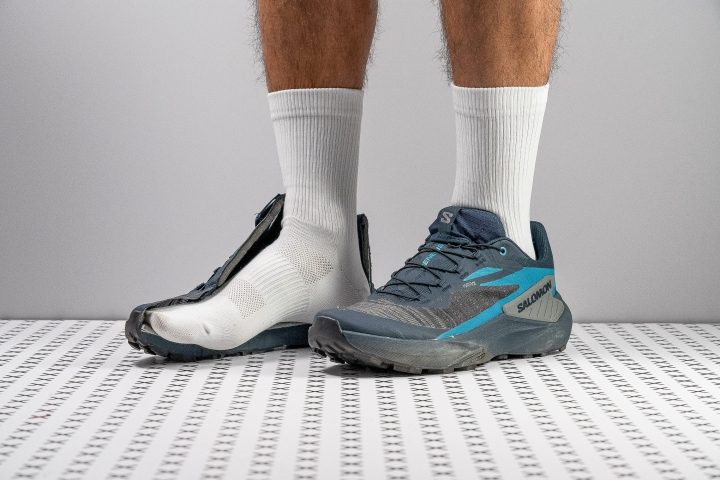Our verdict
- Our top pick in best Salomon trail running shoes
Pros
- Premium MATRYX upper
- Great for summer adventures
- Comfortable for long distances
- Perfect for heel strikers
- Reasonably priced
- Smooth and flexible ride
- Super stable
Cons
- Missing reflective elements
- Outsole wears quickly
- Drop too high for some
Audience verdict
- Top 2% in trail running shoes
- Top 9% in Salomon running shoes
Comparison
The most similar running shoes compared
Who should buy
After thorough testing, we're convinced the Salomon Genesis is an outstanding choice for:
- Trail runners who heel strike and need a reliable, do-it-all shoe for diverse terrains.
- Ultra-distance runners who value a more forgiving ride over the stiffness of carbon-plated options, ensuring comfort mile after mile.
- Fans of Salomon in search of a shoe with a more generous and accommodating fit, making long sessions on the trails more enjoyable.
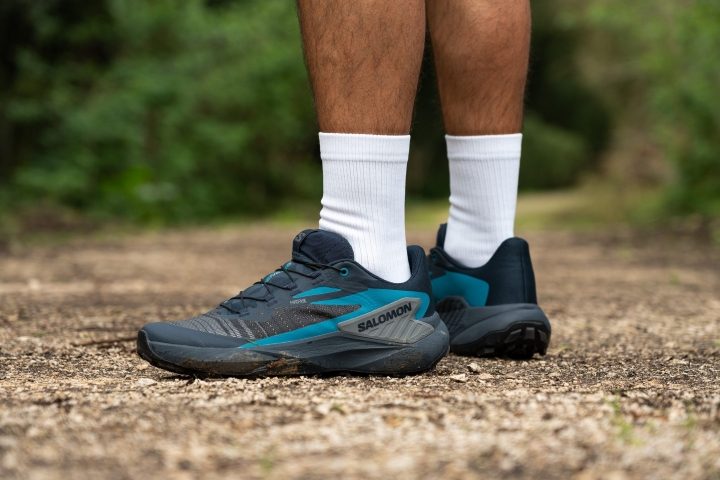
Who should NOT buy
The Salomon Genesis doesn't quite meet the mark for heavier forefoot strikers or those who prefer the plush feel of maximalist trail shoes. We've observed that its cushioning could be lacking for these groups. Consequently, we suggest the ASICS Trabuco Max 3 or the Hoka Mafate Speed 4 as superior alternatives.
Moreover, we've concluded that the Genesis falls short in delivering the high energy return that many seek, especially when compared to shoes equipped with a carbon plate. For those in pursuit of that stiff, propulsive feel, we recommend the Nike Ultrafly or the Hoka Tecton X 2. Our testing has shown that these models offer a more satisfying energy return.
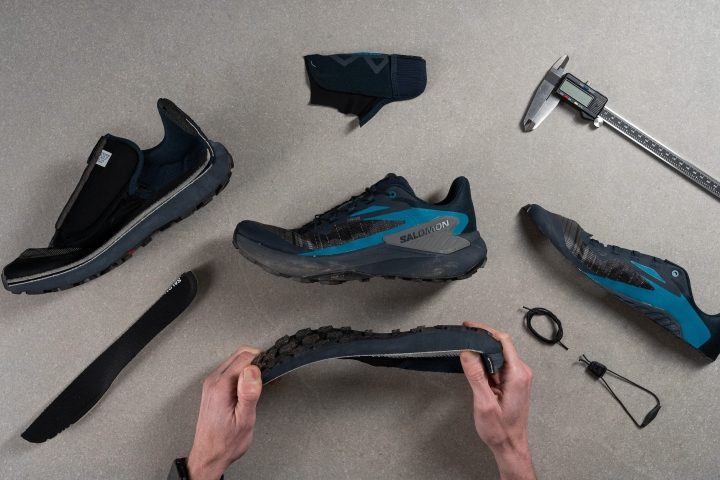
Breathability
The Salomon Genesis truly shines with its MATRYX upper—a marvel of technology that blends exceptional ventilation and remarkable lightness. This ingenious mix of synthetic yarns and a specialized fibers, including Kevlar, positions it as a standout in the world of engineered meshes.
Our initial smoke test revealed its ventilation, earning a solid 4/5—surpassing most trail shoes, despite its reinforced toecap with TPU overlays.
Intrigued by the upper, we held it up to the light. The toebox, to our amazement, showed up almost transparent. This level of thinness is rarely seen in our lab.
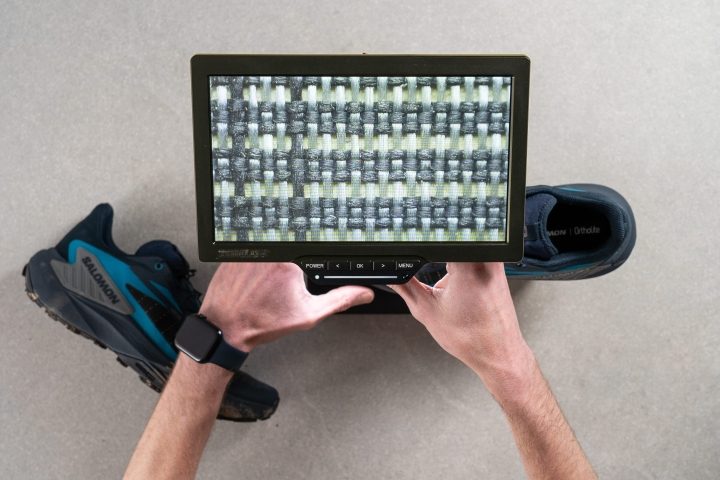
Eager for a closer look, we turned to our microscope. The MATRYX mesh's unique structure was evident—ultra-thin yet airy, delivering excellent breathability.
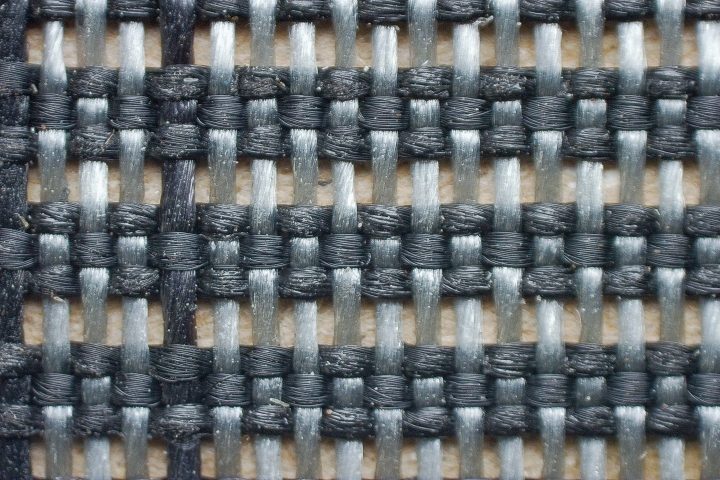
We're keen to assess its durability, as such thin materials often face challenges in harsh tests.
Before moving on to tougher tests, we took a moment to check the upper with our hands.
It offers just the right amount of padding where needed, though the MATRYX fibers' slight roughness might not appeal to all, and we suggest pairing the Genesis with socks of medium thickness or thicker.
| Genesis | 4 |
| Average | 3.3 |
Durability
Toebox durability
In theory, the MATRYX upper's design allows for air to seamlessly flow through, with the Kevlar fibers expected to enhance durability. And here at RunRepeat's lab, it's our mission to see if these features are up to the challenge.
During our standardized Dremel test, the MATRYX upper received a bit of assistance from the TPU overlay. However, upon a detailed inspection, we discovered that despite the overlay sustaining damage, the sandpaper barely left a mark on the MATRYX itself. This resilience earned a solid 4/5 from our team!
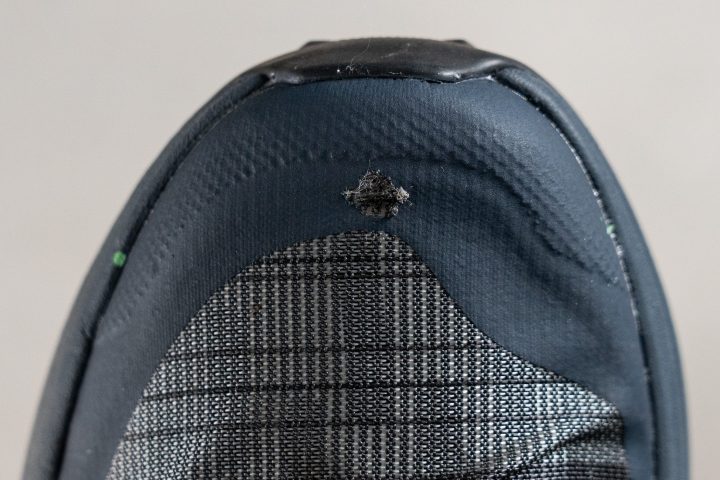
| Genesis | 4 |
| Average | 3.1 |
Heel padding durability
Shifting our focus to the heel padding, we felt that another commendable performance was very likely.
When we fired up the Dremel for another round, our findings confirmed its durability, meriting a well-deserved 4/5 from our team.
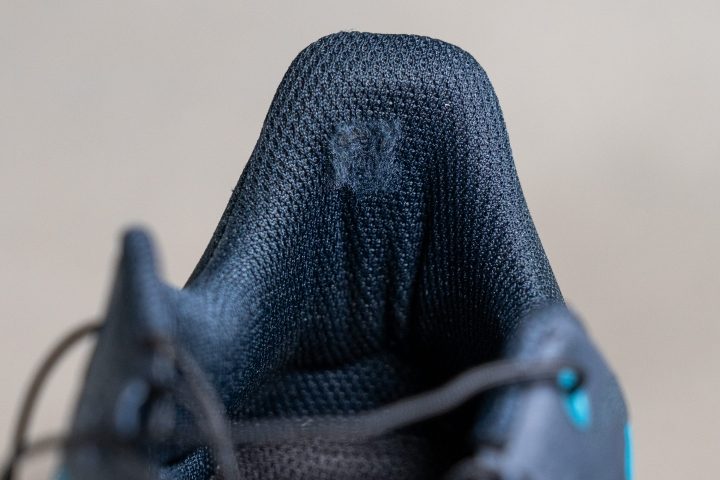
| Genesis | 4 |
| Average | 2.8 |
Outsole hardness
The shoe's upper wowed us with its tough build and breathability, setting high expectations as we examined the outsole. Our initial assessment focused on its hardness.
The Contagrip rubber posted a standard hardness level at 85.5 HC, hinting at satisfactory durability. This prompted us to gear up for yet another Dremel test to verify our findings.
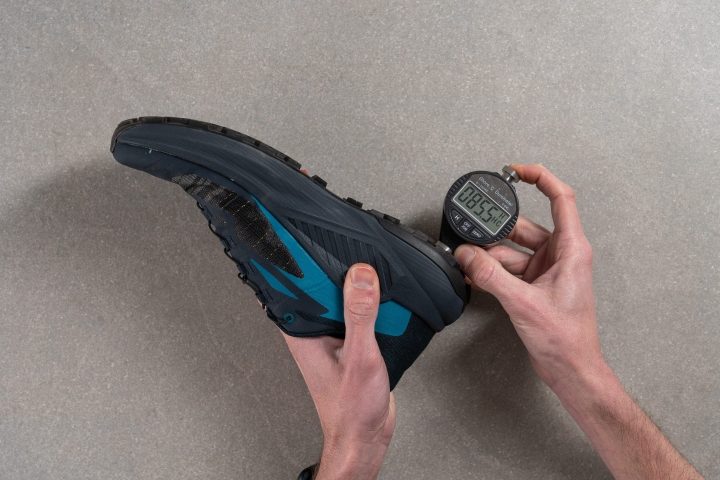
| Genesis | 85.5 HC |
| Average | 85.2 HC |
Outsole durability
We turned up the Dremel to 10,000 RPM and used it longer on the bottom part of the shoe because the rubber part needs a tougher test. This approach is standard for all footwear we scrutinize in our lab—no exceptions.
After looking at the results, we measured a 1.2-mm dent, which was a little disappointing. While not catastrophic, this performance suggests a degree of caution—avoiding highly abrasive terrains could prevent premature wear and extend the outsole's lifespan, aligning it more closely with the upper's durability.
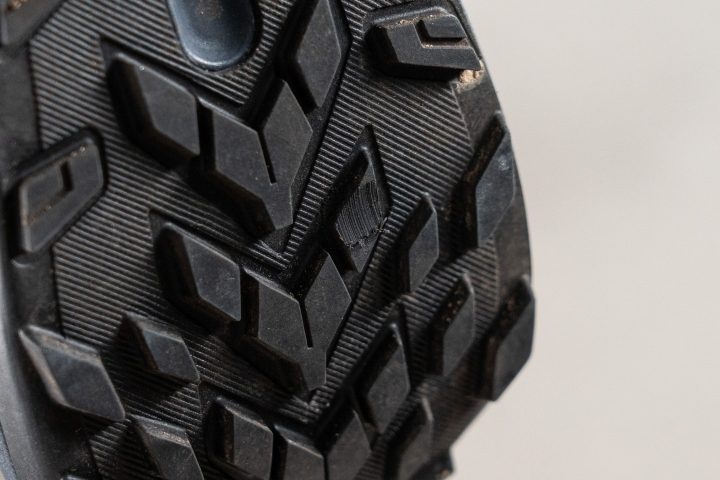
| Genesis | 1.2 mm |
| Average | 0.9 mm |
Outsole thickness
With our vernier caliper in hand, we took the measurement of the outsole thickness, not counting the lugs, and found it to be 2.0 mm thick.
While this thickness serves its purpose, in our opinion, a slightly thicker base could have been beneficial, particularly since the shoe doesn't include a rock plate.
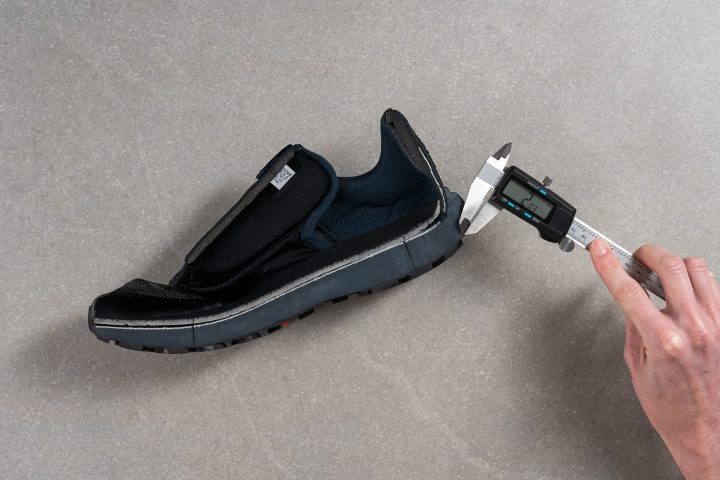
| Genesis | 2.0 mm |
| Average | 2.4 mm |
Weight
At 9.9 oz (282g), Salomon impressively managed to keep the shoe under the 10 oz mark!
The feather-light MATRYX upper deserves a good share of the praise for this achievement, without which the Genesis might have tipped the scales a bit more.
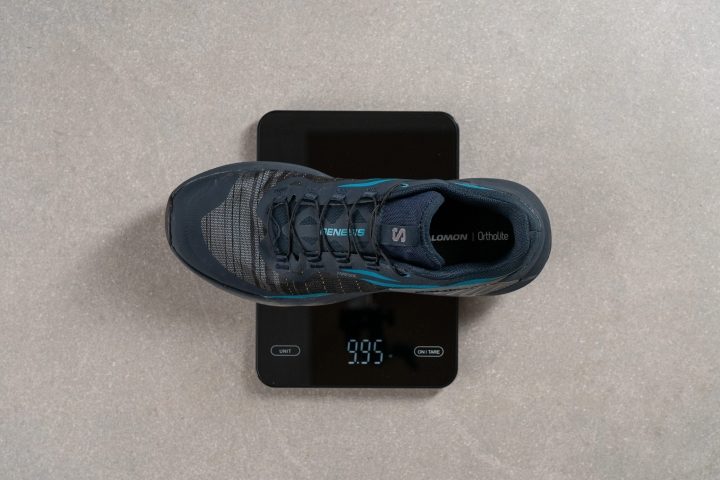
| Genesis | 9.95 oz (282g) |
| Average | 10.37 oz (294g) |
Cushioning
Heel stack
The Genesis heel boasts a 33.5 mm height, striking a perfect balance between the plushness of maximalist models and the agility of sleeker designs like the Altra Lone Peak 8.
This strategic choice keeps the Genesis somewhat light and cushy, perfectly suited for long runs and ultras. After all, it's the shoe Courtney Dauwalter wore to clinch victory at the UTMB, which speaks volumes about its capabilities.
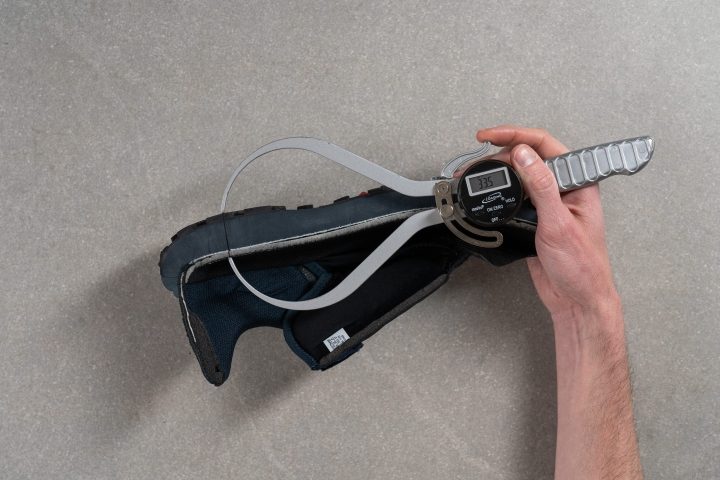
| Genesis | 33.5 mm |
| Average | 32.3 mm |
Forefoot stack
The forefoot stands at a moderate 24.5 mm, offering a comfortable cushion without venturing into maximalist territory—a solid choice for those seeking a balanced yet slightly cushioned feel.
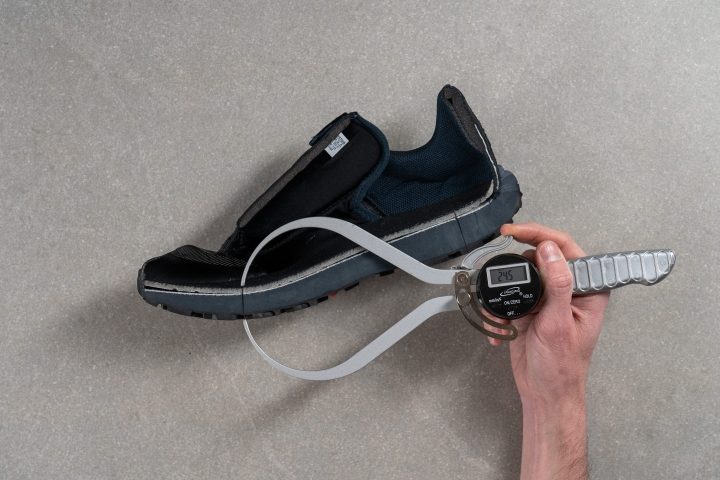
| Genesis | 24.5 mm |
| Average | 24.4 mm |
Drop
The Genesis boasts a notable 9.0 mm drop, placing it on the higher end of the spectrum among trail running shoes. This design is particularly beneficial for long-distance runners prone to Achilles or calf issues, as it helps relieve stress in these areas.
On the flip side, runners who prefer a more moderate drop might not find the Genesis to their liking. For those individuals, we recommend the Hoka Speedgoat 5 for a balanced ride, or the Altra Timp 5 for those seeking the ultimate zero-drop experience.
| Genesis | 9.0 mm |
| Average | 7.9 mm |
Insole thickness
The Genesis comes with a slightly thinner footbed than usual (4.0 mm), but it raises no issues whatsoever and still contributes an added layer of comfort.
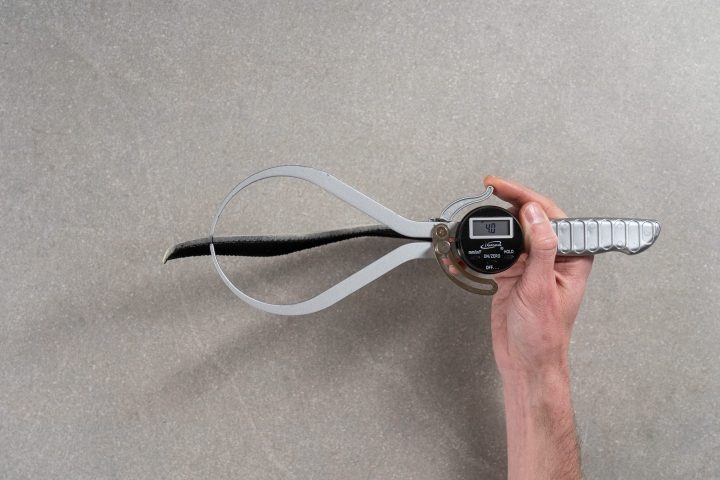
| Genesis | 4.0 mm |
| Average | 4.7 mm |
Midsole softness
Exploring the midsole, we encountered Salomon's Energy Foam—a mix of EVA and OBC (Olefin Block Co-Polymers). While it might not rival top-tier foams like ZoomX or Lightstrike Pro, it significantly outperforms standard EVA foam in terms of energy return.
With a softness score of 22.4 HA, the feel is remarkably balanced, not overly plush but comfortable, ideal for trail running. And given our familiarity with the typically firmer feel of Salomon shoes (like the 34.4-HA Speedcross 6) in recent years, this midsole might even come across as pleasantly soft!
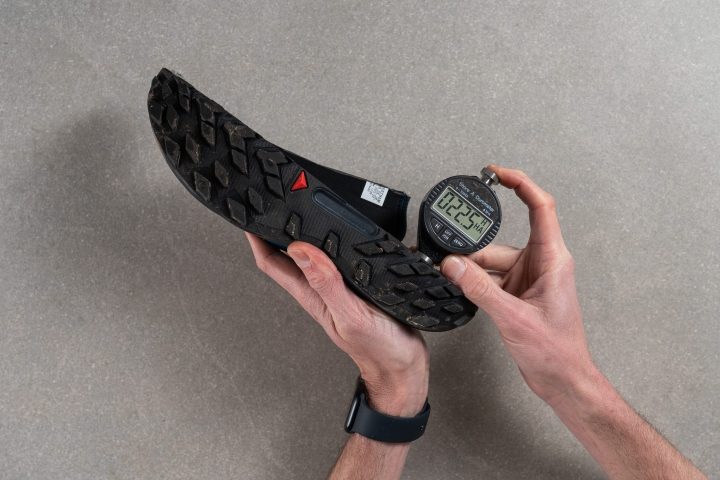
| Genesis | 22.4 HA |
| Average | 23.5 HA |
Difference in midsole softness in cold
Blending EVA with Olefin not only enhances energy return but also boosts cold-weather performance. Unlike standard EVA that often stiffens in the cold, Salomon's Energy Foam impressively only became 13.9% firmer, a remarkable achievement.
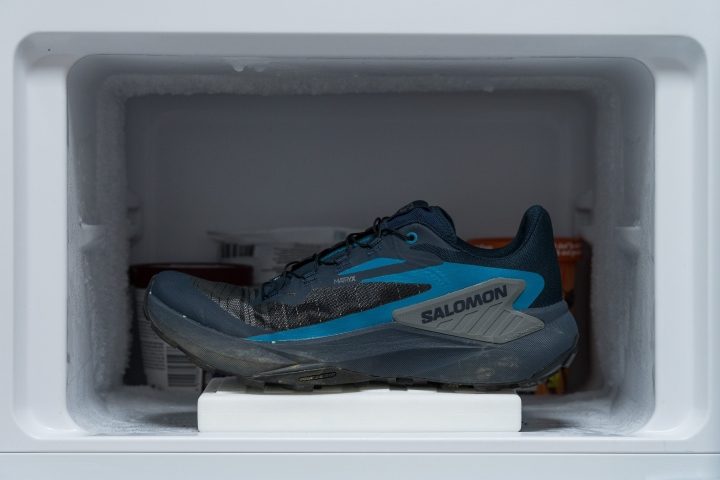
| Genesis | 13.9% |
| Average | 26.8% |
Stability
Lateral stability test
Having examined the foam, we now turn our attention to stability—a crucial element for trail running shoes designed for the long haul. Your ankles will surely thank you for this feature.
The Genesis features Salomon's Active Chassis technology, which incorporates two plastic elements on either side of the shoe, serving as supportive guides. Picture these as substantial sidewalls, yet positioned on the shoe's exterior rather than integrated into the midsole.
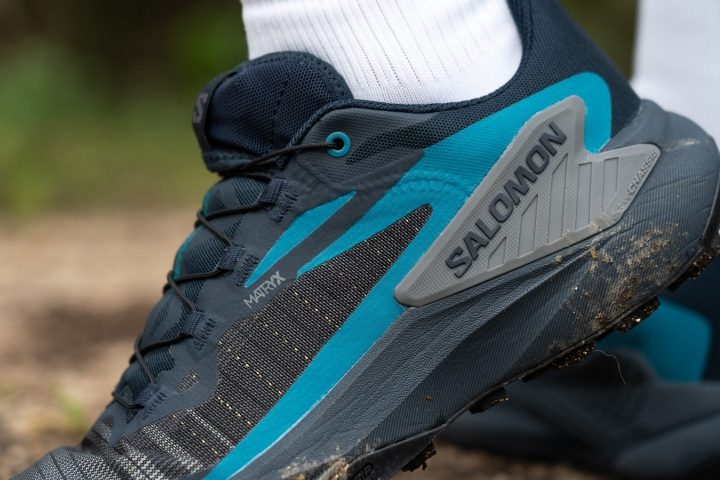
Thanks to these TPU pieces, combined with a balanced midsole and secure heel grip, we believe the Genesis suits those with mild stability needs, though it's still primarily aimed at neutral runners.
Torsional rigidity
Regarding torsional rigidity, the Genesis strikes a balance akin to a road daily trainer—not overly flexible like a barefoot shoe, yet it possesses a certain level of rigidity. This led us to view it as a moderate option, earning a solid 3/5 in our assessment.
| Genesis | 3 |
| Average | 3.6 |
Heel counter stiffness
During our test runs, the heel hold of the Genesis was impressively secure, although occasionally feeling a tad too rigid.
This observation was backed by our hands-on evaluation, where the Genesis earned a 4/5. It leads us to wonder if Courtney experienced any heel slippage in the initial prototypes!
| Genesis | 4 |
| Average | 3.2 |
Midsole width in the forefoot
We took again our calipers to measure the midsole, beginning with the forefoot.
There, we recorded a thickness of 112.3 mm—a standard figure that doesn't particularly distinguish itself from the crowd.
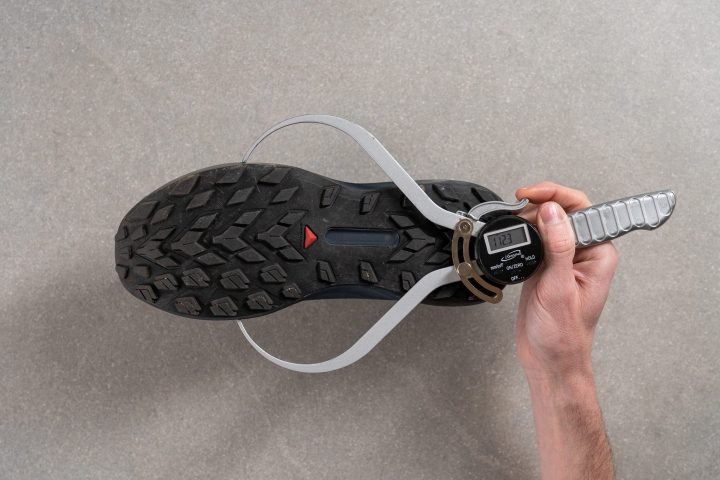
| Genesis | 112.3 mm |
| Average | 111.8 mm |
Midsole width in the heel
Upon taking a second measurement at the heel, we recorded a width of 92.8 mm—slightly more generous than what's typically seen.
This further solidifies our view that this shoe is an excellent pick for heel strikers, boasting a rigid heel counter, a notable drop, and a broader landing area in the heel zone.
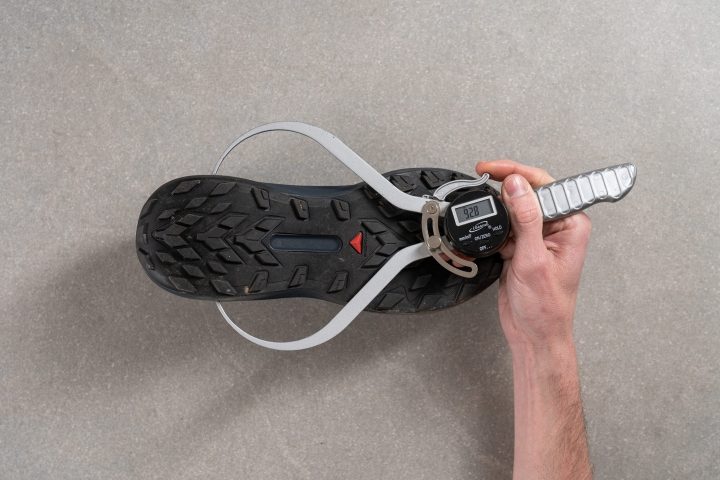
| Genesis | 92.8 mm |
| Average | 89.5 mm |
Flexibility
Stiffness
The absence of a rock or carbon plate in this shoe ensures it maintains a high level of flexibility, a feature many distance runners value on the trails, enhancing ease in navigating turns as a side benefit.
During our 90-degree bend test, the force gauge showed a minimal resistance of just 21.2N, highlighting the shoe's flexibility.
| Genesis | 21.2N |
| Average | 28.8N |
Difference in stiffness in cold
To gauge how the shoe's stiffness might vary in cold conditions, we placed it in the freezer for 20 minutes. Upon retesting with the force gauge, we discovered a mere 12.6% increase in stiffness—a remarkably positive result.
| Genesis | 12.6% |
| Average | 36.4% |
Grip / Traction
Lug depth
Turning our focus back to the outsole, we meticulously examined the lugs and measured their depth at 4.0 mm. This design tries to cater the shoe for versatile terrain use, though it doesn't specialize in any.
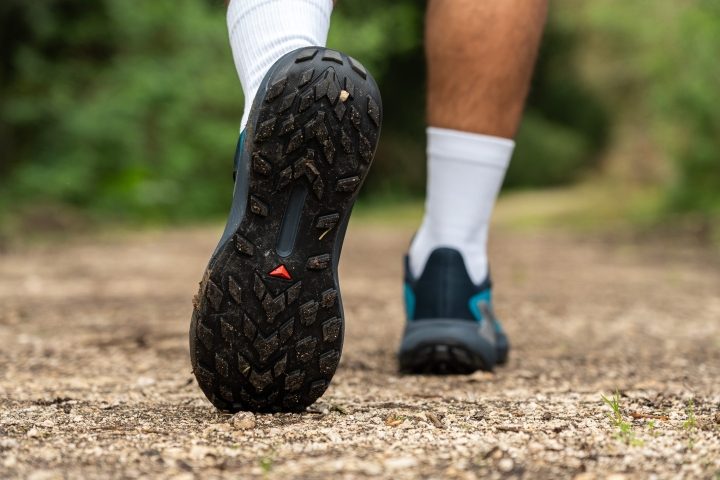
The lugs boast diverse shapes for optimal performance. Central chevron-shaped lugs boost uphill and downhill grip, while varied prism-shaped lugs on the sides and midfoot increase stability and traction during turns.
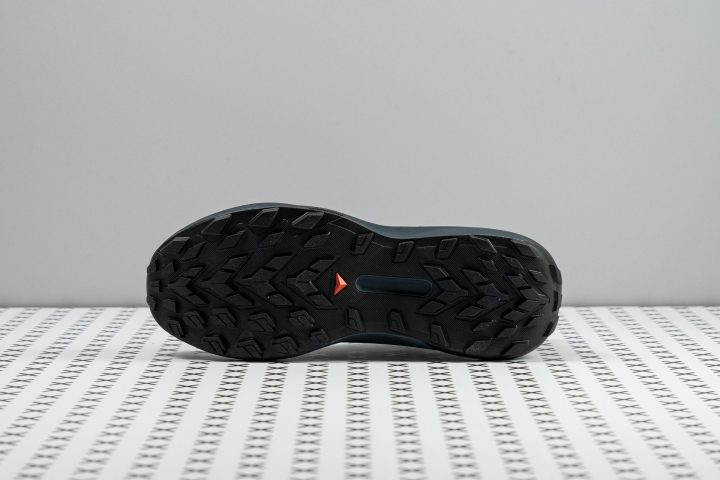
Additionally, the lugs come with self-cleaning technology to release mud, an excellent feature for wet ultra runs.
| Genesis | 4.0 mm |
| Average | 3.5 mm |
Size and fit
Toebox width at the widest part
Salomon typically contrasts with Altra by preferring a snugger fit and tighter toeboxes. However, the Genesis, designed for ultra marathons and long workouts, offers a more accommodating toebox width of 98.5 mm, which we found to be suitable for a wide range of foot sizes.
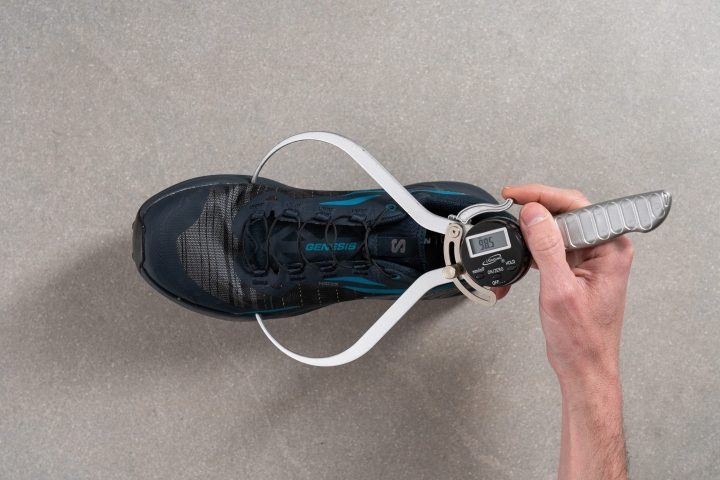
| Genesis | 98.5 mm |
| Average | 98.8 mm |
Toebox width at the big toe
The area around the big toe tapers off in a common fashion, providing sufficient room for toe splay.
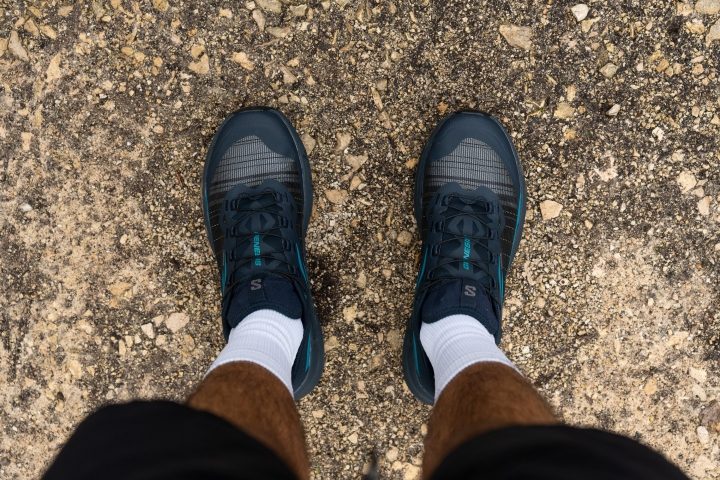
The MATRYX upper looks really different from everything else.
This design meets the basic requirements for ultra distances and we find it quite satisfactory. For those accustomed to tighter-fitting shoes, this model will likely feel surprisingly spacious, even though it's actually quite standard in width.
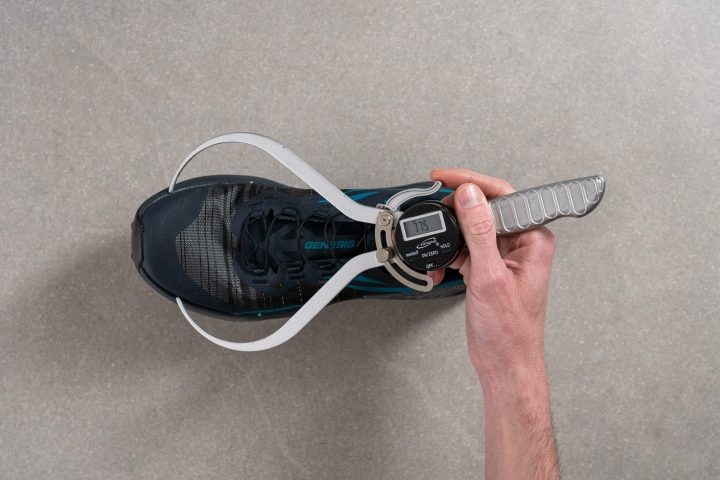
| Genesis | 77.5 mm |
| Average | 78.6 mm |
Tongue: gusset type
The tongue's full gusseting ensures both an exceptional lockdown and minimal debris entry—essential features for any top-tier trail shoe.
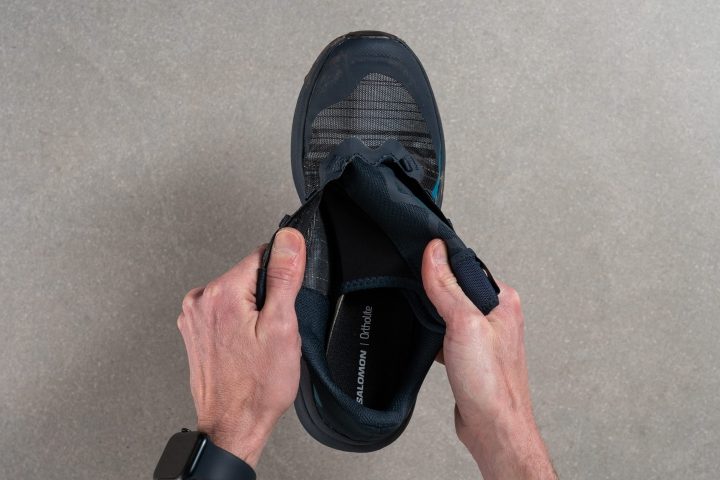
| Genesis | Both sides (full) |
Comfort
Tongue padding
Upon further assessment of the tongue, we noted an 8.3 mm thickness, which was unexpectedly plush for this type of shoe!
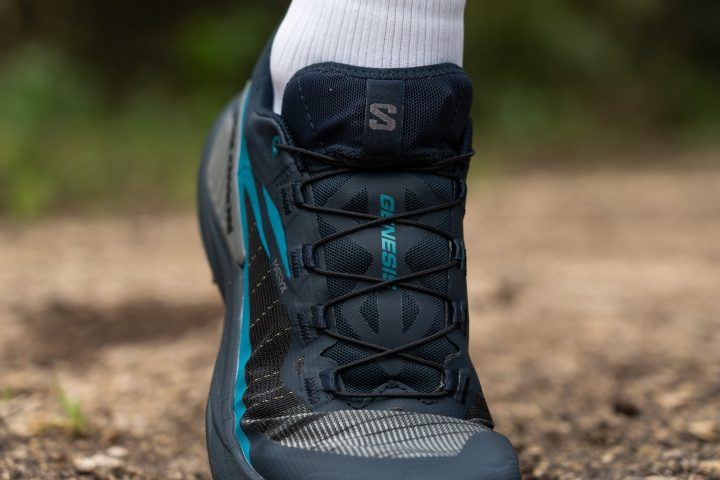
The Genesis is equipped with Salomon's patented Quicklace system, allowing for effortless tightening with just a single pull. And it looks super clean!
Although comfort is essential for a long-distance companion like this, we believe a slimmer (5 or 6 mm) tongue could reduce weight without compromising instep comfort.
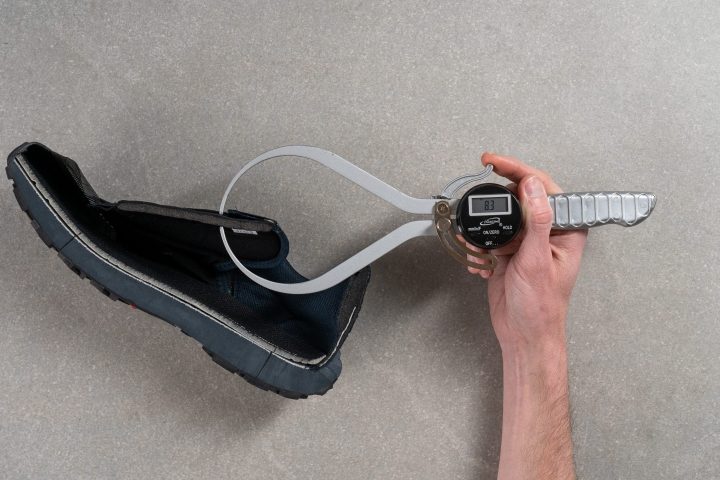
| Genesis | 8.3 mm |
| Average | 6.5 mm |
Heel tab
Although it lacks a finger-loop heel tab, the Genesis boasts an extended heel collar, providing a convenient grip point for fit adjustments.
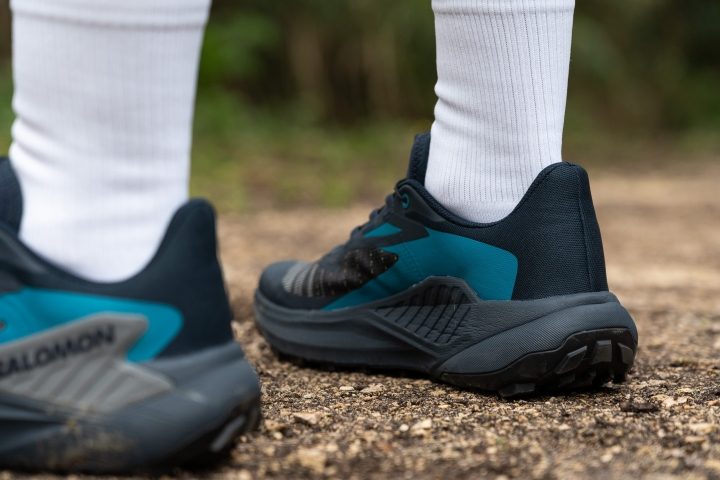
| Genesis | Extended heel collar |
Removable insole
The Ortholite insole is detachable since it isn't glued at all, allowing for easy removal.
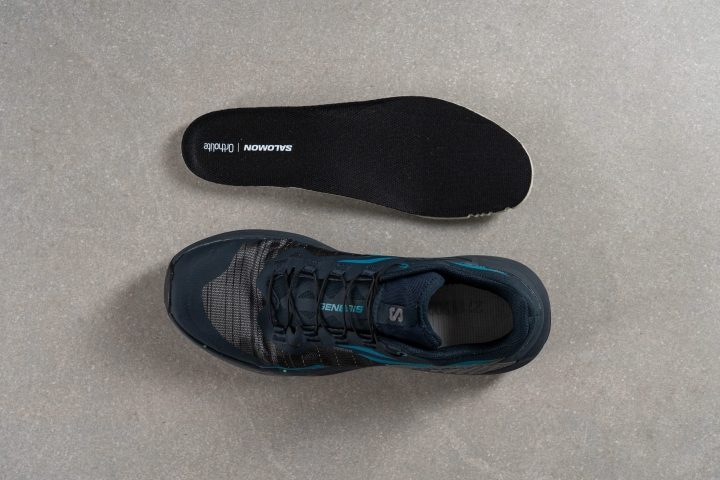
| Genesis | Yes |
Misc
Reflective elements
So far, the Salomon Genesis had justified its fair price tag in our eyes. However, we were quite disappointed to discover it lacked reflective features, particularly given its design for the UTMB—an event known for evening start and nighttime racing segments.
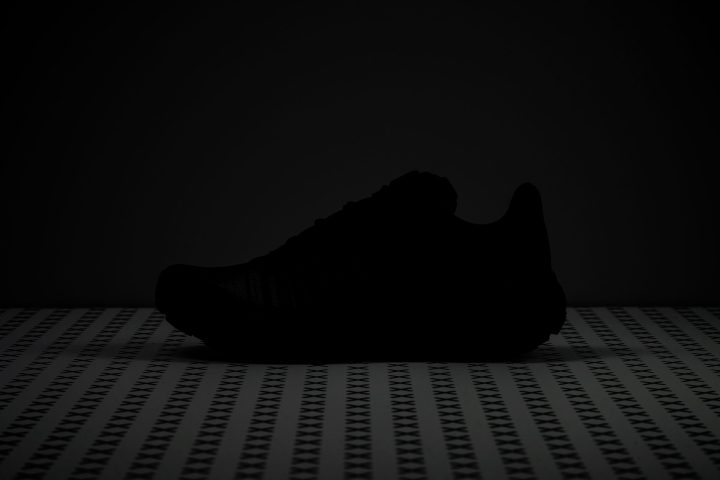
| Genesis | No |

